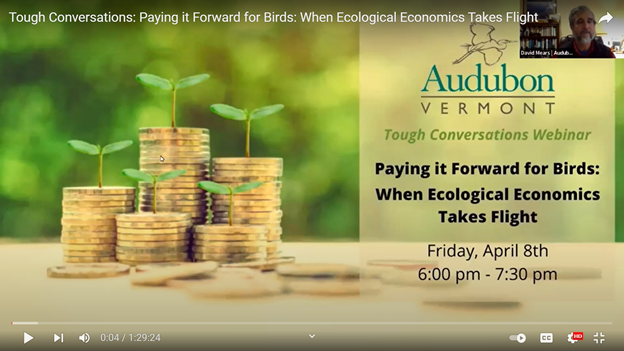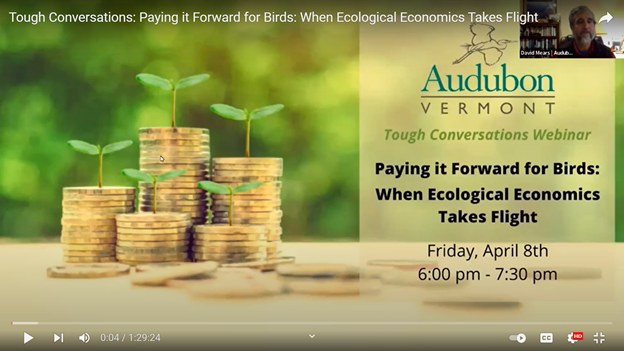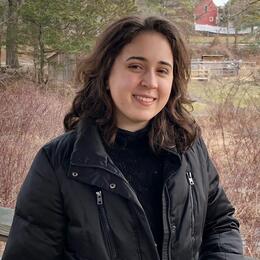Written by Monica Diaz, with input from Christina Cambria, Linnea Tootsov and Mia Handte-Reineke, collectively a group of Audubon Vermont interns and part of Audubon Vermont’s Youth Conservation Leadership Program.
On April 8, just days after the United Nations’ Intergovernmental Panel on Climate Change (IPCC) report warned that we have approximately eight years to start cutting global emissions in half, the Audubon Vermont interns joined panelists Rigo Melgar, Sam Bliss, and Skyler Perkins in a Tough Conversations webinar. (Find additional information the webinar and speakers here). This group of young ecological economists discussed how economic and market strategies can be used to tackle some of the world's most pressing climate and environmental challenges.
View the webinar recording:
The webinar began with a broad discussion of the panelists’ personal relationship to the environment and why it is important to each of them to understand ecological economics. Sam emphasized that caring about the environment and climate change is unavoidable. He took a personal approach, saying “My relationship to the environment is that I am the environment. I'm made out of it, just like we all are.” Indeed, in Sam’s view, everything that we consume in nature becomes part of ourselves, creating a sense of interdependence among us as members of an ecosystem. Sam later expanded this theme to include human communities, noting that the environment provides the natural resources that societies need to thrive, and in using these natural resources to produce energy that fuels production, we unavoidably emit pollutants into the environment, which then limits resources available to use in the future.
Skyler indicated that the topic is relevant now more than ever as we are facing unprecedented population growth, consumption, extinctions, and debt. According to Skyler, this interdependence can also be observed in the way the economy functions: “There's this sort of romantic idea of nature that every organism is, in a sense, this reflection of everything else, and there's this remarkable interdependence. And I’m introducing that idea because I think that's also true of the economy.” Through this initial dialogue among the panelists it became clear that it is impossible to separate environmental issues from economic issues because the two are intrinsically connected.
Both the carbon tax and cap and trade are examples of market-based solutions that work within our current economic model to limit carbon emissions. While many see promise in these policies, there are also some downsides to consider. Rigo explained that if these market-based policies were put in place in the United States, they would have to be accompanied by subsidies for things such as weatherization and electrification, to ensure that the burden on lower income communities would not be overwhelming and that there could be a smooth and just transition to cleaner energy: "If you're going to have a carbon tax…you have to find a way for the government to redistribute that through incentives to weatherize their homes, to pay for electric cars, whatever it's gonna take for you to move away from fossil fuels.”
Each of the panelists noted that burdens to lower income communities as a result of cap and trade and similar market-based policies are a serious concern because, as Sam explained, “They're raising the price of basic necessities for people who are living paycheck to paycheck at the same time as they're probably not changing the price of things enough to convince the rich to take that many fewer flights to take out their super yacht.”
Another one of Sam’s objections to carbon tax and cap and trade policies was that they simply will never gain the kind of support from the public that is needed to make real change: “It's not something people normally take to the streets for. And it is the masses of people taking to the streets that get reforms enacted.” Sam went on to criticize agencies such as the IPCC for their single-minded reliance on the carbon tax when creating models of the economy, which he suggested allows them to create projections “without having to get into all the nuances.” The other panelists agreed and emphasized the importance of a multiple pronged approach to addressing climate change, stating that just one strategy, whether cap and trade or any other singular approach, on its own will not suffice.
When posed with the question of whether it might be necessary to consider alternative economic models to the current approach, which relies upon the concept of perpetual growth, the panelists generally agreed that other models have potential. Solutions such as a carbon tax and cap and trade might not be as effective as a total transformation of our current social and economic systems. “I’m a fan of ‘degrowth’” Sam said with a smile. According to Sam, degrowth involves decreasing economic activity while redistributing wealth and resources:
“The idea of degrowth is . . . what if we did less economic activity in rich countries where there's already way more than enough to go around, and it's just poorly distributed?....so we do less overall economic activity and focus it on scaling down from the most harmful and the most useless sectors….As a social movement, the idea is to oppose economic growth as the goal around which society is organized.”
Of course, such a radical change would likely face opposition by many who would argue that decreasing the size of the economy would lead to a recession and loss of jobs. How, for instance, would the average American sustain themselves under this model? Sam responded to these concerns by saying: “People's basic needs need to be guaranteed…no one's going to ever agree to a smaller economy overall if that means a recession, if that means that their access to food and shelter is compromised by such a shrinking….if everyone were guaranteed housing rent-free, then we might choose to work less and produce less.”
Skyler concurred that degrowth is an interesting concept that has potential, especially when taking into consideration that “We've really passed by a point where [economic growth] is making us happier [or] improving our democracy.” He noted that goods that used to be considered wants are being treated as needs. Sam elaborated on this idea, saying: “There's actually abundant research that basically after you get to a state of secure prosperity, not luxury, then everything after that is not a substantive improvement in our lives.”
Skyler expressed that it might start to be more valuable for us to take more time to appreciate what we have, our existing ecological assets over our wants, or otherwise risk undermining our ability to have either.
In their final remarks, Sam, Skyler, and Rigo shared their thoughts on our collective responsibility to pursue change:
“The idea that regular people need to change their habits and that's going to fix things is wrong, but also the idea that we're going have a policy change, or some sort of technological change, that makes it so regular people don't have to change their habits, is also totally wrong.” –Sam
“We need this global sense of group. People in their own heart have to weigh these judgments and decisions.” –Sklyer
“Ultimately, I think we have to understand that we are connected, and move beyond all of that, but really, what are we trying to sustain? We're trying to sustain human quality of life while protecting the rest of nature. Because we know that's what gives meaning to it all.” –Rigo
As the organizers of this event, we came away from this conversation with a firm sense that the environment is not just “another issue” to consider when drafting policy goals, nor is the question of how to protect the environment separate from the question of how to manage our economy. Rather, the question of protecting the environment requires that we understand and are intentional about the resources we are using, where they come from, and the ways in which our economic and political systems allocate those resources. When thinking about these issues, the speakers agreed that it is not important who should take the blame. Instead, we should all become informed on the actions we can take in our daily lives, including how we participate in the economy and our political system, as we envision a more sustainable future -- a future with a shared prosperity and equitable access to nature and a healthy environment.
We appreciated the opportunity to participate in this thoughtful and informative dialogue and thank Sam, Skyler and Rigo for taking the time to prepare for and participate in this stimulating and tough conversation!






